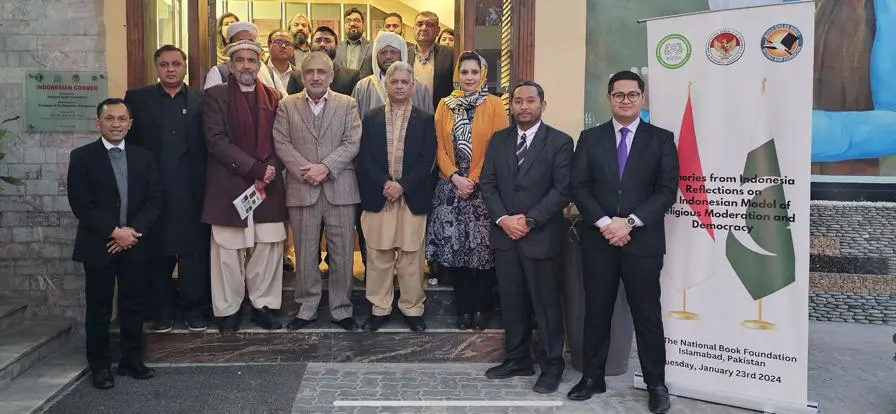Zubair Qureshi
The Embassy of the Republic of Indonesia in Islamabad, in collaboration with the International Research Council for Religious Affairs (IRCRA), organized an experience-sharing session titled “Memories from Indonesia: Reflections on the Indonesian Model of Religious Moderation and Democracy,” at the National Book Foundation (NBF).
Chief Guest, Chairman of the Council of Islamic Ideology, Dr. QiblaAyaz, noted that Indonesia’s approach to tolerance has evolved into appreciation, respect, and acceptance of other faiths and cultures. Dr. Ayaz added that Indonesian religious harmony, moderation and role of their two big Muslim organizations could be good learning experience for all. “We can learn from Indonesia’s journey”, he concluded his keynote speech.
“In the wake of current global challenges, both Indonesia and Pakistan need concerted efforts to share best practices to promote tolerance, moderation, gender equalities, and to ensure positive contribution of individuals in the political democratic system,” said the Indonesian Chargé d’Affaires, Mr. YusranHardromi in his welcoming remarks.
During the session, speakers shared their perspectives and comments on current Indonesia, emphasizing the strategic roles in nation building played by the two largest Indonesian Muslim organizations, namely NahdlatulUlama and Muhammadiyah, as well as the critical contribution by Indonesian female ulemas in advancing gender equality. In addition, the democracy in Indonesia was also their attention as the Indonesians are currently preparing the general elections in February 2024.
“The religion should be a source of goodness, and different opinions of scholars of Fiqh are not meant to create divisions but provides new ways to the people according to the needs and priorities of their societies,” explained Mr. KhurshidNadeem, Chairman of Rahmatul-Lil-AlameenWaKhatamunNabiyyin Authority.
Pakistani prominent politician, Barrister Zafarullah Khan said, “The inclusion of minorities even Ahmadis in political and social progress is allowed in Indonesia. There is no distinction on gender basis in the Country and their religious ulemas and scholars are well educated and interpret religion as mercy (rahmat) for all mankind with element of universality and gender justice.”
Ms. BeenishIrfan Khan, an activist in gender inclusion and women’s rights in Khyber Pakhtunkhwa (KP) province emphasized the Indonesian women’s independence and active roles in politics and society, underscoring the acceptance of other faiths as a notable element of Indonesia.










